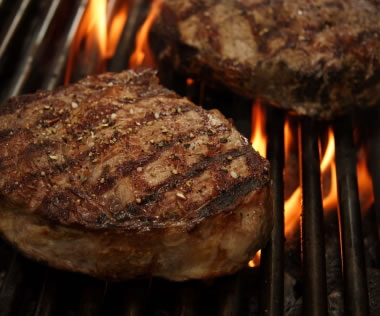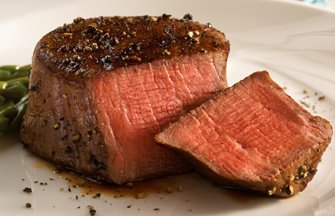Another (potential) strike against red meat
Replies
-
That's a load of poo0
-
That's interesting. I read a study a while back that L-carnitine is good for your heart.
ETA: I think this is the one that I read.
http://www.umm.edu/altmed/articles/carnitine-l-000291.htm
It is.0 -
they don't scare me.


 0
0 -
Bacon is still better.
Bacon is red meat.
Wait... What?0 -
No it is the other white meat lol!0
-
I like this part:
"Even after consuming a large amount of carnitine, vegans and vegetarians did not produce significant levels of TMAO, while omnivores did, according to the study in the current issue of the journal Nature Medicine."
So, even being part-time vegetarian has health benefits!
An omnivore IS a part-time vegetarian. :laugh:0 -
I like this part:
"Even after consuming a large amount of carnitine, vegans and vegetarians did not produce significant levels of TMAO, while omnivores did, according to the study in the current issue of the journal Nature Medicine."
So, even being part-time vegetarian has health benefits!
An omnivore IS a part-time vegetarian. :laugh:
We'll have none of that clever, sexy logic in here!0 -
The study specifically identifies "long-term (5-year) vegetarians and vegans" not just vegetarians and vegans.0
-
I like this part:
"Even after consuming a large amount of carnitine, vegans and vegetarians did not produce significant levels of TMAO, while omnivores did, according to the study in the current issue of the journal Nature Medicine."
So, even being part-time vegetarian has health benefits!
An omnivore IS a part-time vegetarian. :laugh:
We'll have none of that clever, sexy logic in here!
Awww....*sniffles* I mean technically...they are...*sniffles again*0 -
I like this part:
"Even after consuming a large amount of carnitine, vegans and vegetarians did not produce significant levels of TMAO, while omnivores did, according to the study in the current issue of the journal Nature Medicine."
So, even being part-time vegetarian has health benefits!
An omnivore IS a part-time vegetarian. :laugh:
We'll have none of that clever, sexy logic in here!
Awww....*sniffles* I mean technically...they are...*sniffles again*
Daww okay. Come 'ere. 0
0 -
I like this part:
"Even after consuming a large amount of carnitine, vegans and vegetarians did not produce significant levels of TMAO, while omnivores did, according to the study in the current issue of the journal Nature Medicine."
So, even being part-time vegetarian has health benefits!
An omnivore IS a part-time vegetarian. :laugh:
We'll have none of that clever, sexy logic in here!
Awww....*sniffles* I mean technically...they are...*sniffles again*
Daww okay. Come 'ere.
 0
0 -
I declare this thread well hi-jacked, and now totally positive. Joy and I are going out for steak.0
-
I declare this thread well hi-jacked, and now totally positive. Joy and I are going out for steak.
and green beans and broccoli (because I'm an omnivore aka part-time vegetarian)0 -
No one said humans are a smart animal or that we know exactly what to eat. We are an opportunist as evidenced by how many things we decided to eat based upon our geographical advantage.
While certain diets may not be optimal we seemed to have been able to adapt to those different deficiencies.
If given a choice it may be wise to follow advice given by those studied in nutritional science.
We have conventional knowledge which allows us something our forebears lacked.
uld have us led back to the dark ages.
Science is not an entity to be feared, it is a tool given to us all. It's self regulating.0 -
.0
-
I eat my steak with a bottle of red wine. This way I am assured that all bacteria is alcoholized and neautralized! :drinker:
^^^This is brilliant! :laugh:0 -
Good time to be vegetarian.0
-
no it isntGood time to be vegetarian.0 -
in todays times everything is pretty much unhealthy and dangerous to eat.0
-
This content has been removed.
-
It does amuse me a little that the very same people who, in a fitness related thread, will be banging on about the importance of 'evidence' and 'research' dismiss 'evidence' and 'research' without any thought or argument, when it doesn't fit with their particular view on the world.
I don't care who does and doesn't eat read meat, for the record. But the dodgy logic on this thread entertains me.0 -
The study specifically identifies "long-term (5-year) vegetarians and vegans" not just vegetarians and vegans.
So, maybe I'm ok: omnivore for just over a decade, vegetarian for the next decade or so and pescatarian for well over a decade now (with a blip for pregnancy cravings which were cured by the fact I don't LIKE meat).0 -
Personally I know the weakneses of the studyIt does amuse me a little that the very same people who, in a fitness related thread, will be banging on about the importance of 'evidence' and 'research' dismiss 'evidence' and 'research' without any thought or argument, when it doesn't fit with their particular view on the world.
I don't care who does and doesn't eat read meat, for the record. But the dodgy logic on this thread entertains me.
The study has not been done in a controlled isocaloric environment to compare the two.
Since carnivorous people do take up most of the population. They are much more likely to consume food such as mcdonalds, burger king, or caloric dense foods.
There are too many variables left from this study that are not discusses such as being in a isocaloric state.
The BMI from the test subjects are also overweight and we do not know the effects of it on someone who is already healthy.
There are also studies that talks about carnitine and the effects of heart health. So these studies need to be replicated because the studies have a lot of open ended questions0 -
i love red meat - bacteria and all -- I don't even wash my veggies
unless they're your own, then nom nom nom pesticides!0 -
Speaking from a scientific standpoint, the study is actually quite well done, and the authors performed a number of additional observational and interventional studies that helped strengthen the presumptive but not proven association between carnitine consumption, the action of gut flora, and production of TMA and thereby TMAO, an established atherogen.
This is an intriguing study that supports an alternative mechanism of red meat consumption-associated atherogenesis, one that challenges the conventional wisdom. A degree of healthy skepticism is natural and indeed justified. As with any solitary study, there will be limitations due to study design as well as a need for follow-up studies to confirm/refute the findings, as well as to further elucidate the underlying mechanisms. But to simply discount it altogether, citing that it has flaws or limitations (which all studies have to some degree) or is as yet unsupported by other studies, is as equally erroneous as relying upon it as gospel.
Paradigm shifts in scientific thought occur all the time. When a study, however rigorously performed, significantly challenges the established thinking, it is generally greeted with a high degree of skepticism. As a case in point, the bacterial infection hypothesis of peptic ulcers was widely discounted at the time, but eventually was accepted as truth and earned the initial proponent(s) a Nobel Prize. More importantly, this new understanding of the mechanism of peptic ulcer formation led to a more rational management for peptic ulcers that avoided prolonged medical treatment or potentially risky surgery in favor of specific and effective treatment in the form of antibiotic therapy.
In the same way, if the weight of accumulated evidence builds in favor of the carnitine-bacterial production of TMAO hypothesis, this paradigm shift will spur new lines of research into the development of targeted therapies that specifically block the synthesis or action of TMAO. Accordingly, just as we now have statins to help manage high cholesterol, we may in the future have agents that can block TMAO. This isn't to advocate counteracting poor eating habits by taking pharmaceuticals, but in the future those carnivores/omnivores among us (myself included) may be able to enjoy that occasional steak while avoiding some of the negative health impacts that have been traditionally associated with its consumption.
Cheers!
-- yellowabc0 -
I eat my steak with a bottle of red wine. This way I am assured that all bacteria is alcoholized and neautralized! :drinker:
^^^This is brilliant! :laugh:
I'll remember that for my pork syabusyabu tomorrow night, thank you! :drinker:0 -
It does amuse me a little that the very same people who, in a fitness related thread, will be banging on about the importance of 'evidence' and 'research' dismiss 'evidence' and 'research' without any thought or argument, when it doesn't fit with their particular view on the world.
I don't care who does and doesn't eat read meat, for the record. But the dodgy logic on this thread entertains me.
Interesting. I have not actually seen that in this thread.0 -
It does amuse me a little that the very same people who, in a fitness related thread, will be banging on about the importance of 'evidence' and 'research' dismiss 'evidence' and 'research' without any thought or argument, when it doesn't fit with their particular view on the world.
I don't care who does and doesn't eat read meat, for the record. But the dodgy logic on this thread entertains me.
Interesting. I have not actually seen that in this thread.
Are you sure? The first few pages seemed to me to be largely focused on 'ah, rubbish, I'm going to carry on eating meat, and vegetarians are silly'... Perhaps we read a different thread?0 -
Agree with Matt Wild on this. The quality of the meat would be an important factor.
yellowabc, well said.
Also, I'm sure this won't be that much of an issue in high intensity and high volume training program in a relatively well trained individual will.
I think we should all shut up and watch this beautiful woman sing JT's Suit and Tie: http://www.youtube.com/watch?v=7_3hKVxOcRI 0
http://www.youtube.com/watch?v=7_3hKVxOcRI 0 -
Speaking from a scientific standpoint, the study is actually quite well done, and the authors performed a number of additional observational and interventional studies that helped strengthen the presumptive but not proven association between carnitine consumption, the action of gut flora, and production of TMA and thereby TMAO, an established atherogen.
This is an intriguing study that supports an alternative mechanism of red meat consumption-associated atherogenesis, one that challenges the conventional wisdom. A degree of healthy skepticism is natural and indeed justified. As with any solitary study, there will be limitations due to study design as well as a need for follow-up studies to confirm/refute the findings, as well as to further elucidate the underlying mechanisms. But to simply discount it altogether, citing that it has flaws or limitations (which all studies have to some degree) or is as yet unsupported by other studies, is as equally erroneous as relying upon it as gospel.
Paradigm shifts in scientific thought occur all the time. When a study, however rigorously performed, significantly challenges the established thinking, it is generally greeted with a high degree of skepticism. As a case in point, the bacterial infection hypothesis of peptic ulcers was widely discounted at the time, but eventually was accepted as truth and earned the initial proponent(s) a Nobel Prize. More importantly, this new understanding of the mechanism of peptic ulcer formation led to a more rational management for peptic ulcers that avoided prolonged medical treatment or potentially risky surgery in favor of specific and effective treatment in the form of antibiotic therapy.
In the same way, if the weight of accumulated evidence builds in favor of the carnitine-bacterial production of TMAO hypothesis, this paradigm shift will spur new lines of research into the development of targeted therapies that specifically block the synthesis or action of TMAO. Accordingly, just as we now have statins to help manage high cholesterol, we may in the future have agents that can block TMAO. This isn't to advocate counteracting poor eating habits by taking pharmaceuticals, but in the future those carnivores/omnivores among us (myself included) may be able to enjoy that occasional steak while avoiding some of the negative health impacts that have been traditionally associated with its consumption.
Cheers!
-- yellowabc
I agree, it's early days on this study, but there does seem to be a largish body of evidence building up that makes the hypothesis at least interesting to look at.
I also think (in reference to the other post about processed vs 'cleaner' meats) that it's important to remember that processed meats are found outside burger king and macdonalds. There's a European study, came out a couple of weeks ago, that highlighted specific higher risks associated with sausages, for instance
For me, this comment from this blog is perhaps the most important thing to focus on:
"What's lost in all the hysteria is the fact that the study at hand could in fact provide insights into the often-touted involvement of the gut microbiome in the etiology of all sorts of diseases... this, and not the "red meat is fill in whatever you like for you" debate, is what could actually help us to reduce the number of CVD related deaths on both an the large nation- and world-wide, as well as on a personal level."
http://suppversity.blogspot.co.uk/2013/04/meaty-news-choline-carnitine-bacteria.html?spref=fb0
This discussion has been closed.
Categories
- All Categories
- 1.4M Health, Wellness and Goals
- 398.5K Introduce Yourself
- 44.7K Getting Started
- 261K Health and Weight Loss
- 176.4K Food and Nutrition
- 47.7K Recipes
- 233K Fitness and Exercise
- 462 Sleep, Mindfulness and Overall Wellness
- 6.5K Goal: Maintaining Weight
- 8.7K Goal: Gaining Weight and Body Building
- 153.5K Motivation and Support
- 8.4K Challenges
- 1.4K Debate Club
- 96.5K Chit-Chat
- 2.6K Fun and Games
- 4.8K MyFitnessPal Information
- 18 News and Announcements
- 21 MyFitnessPal Academy
- 1.5K Feature Suggestions and Ideas
- 3.2K MyFitnessPal Tech Support Questions


















